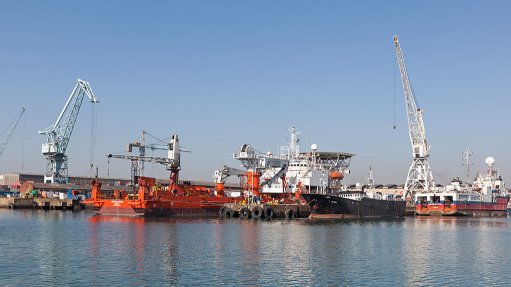
JOB MULTIPLIER POTENTIAL As long as there is sustainable growth, the knock-on effect is job creation
The shipbuilding and ship repair industries, employ millions of people globally, and thus have the potential to provide substantial benefits to the local economy, says ship repair company Elgin Brown & Hamer South Africa (EBH SA) GM Rob Deane.
He notes that through the multiplier effect, job creation follows growth.
“It is not just about a shipyard creating jobs, it is the entire shipping industry supply chain, which creates forwards and backwards linkages in relation to job creation. For example, if a growing shipyard requires more steel, the steel company’s steel mill, and the mine where the ore is sourced, will require more people.
“Transport, fuel, electricity, administration are all related areas, which are impacted by growth and job creation. The forward linkages relate to increased spend by employees on houses, fuel, electricity, water, and the like, which in turn, generate income in those sectors.”
Moreover, Deane says that as long as there is sustainable growth, the knock-on effect is job creation, not only for employees but subcontractors and suppliers - the impact of which is felt all the way down the supply chain.
Skills & Training Development
Meanwhile, Deane notes that EBH SA and its affiliate company in Namibia, EBH Namibia, in partnership with heavy engineering group DCD, have initiated several training programmes to ensure that its employees are at the top of their areas of expertise.
An example of this is EBH SA’s artisan development project, which trains, qualifies and, where possible, employs the apprentices in the group.
To date, the company has had 22 apprentices participate in its artisan development project.
“In this way, the marine cluster companies are coordinating their human resources needs and leveraging off each other’s areas of expertise and, in terms of skills, the marine cluster of EBH SA, EBH Namibia and DCD has resulted in significant opportunities for synergies to be achieved,” says Deane.
Further, he explains that the nature of the shipping industry is that there are peaks and troughs in demand and workload.
“In peak times, it can be difficult to supply adequate skills and services to the industry. But within the cluster, we can share the load. For example, Cape Town has been able to access skills and resources from Durban for larger jobs. This serves to give the client a better service, ultimately,” Deane states.
Working Partnerships
Moreover, Deane notes that such synergies also exist in a wider context, as EBH SA has established strong working relationships with other players in the maritime industry, most notably with State-owned port operator Transnet Ports Authority (TNPA).
“Our relationship with the TNPA is important in furthering the aims of the industry as a whole and its impact on the national economy,” he emphasises.
Deane says that while ship repair is not the TNPA’s core business, EBH SA has made progress over the years in communicating what the requirements are for its Durban facility and for the future of the facility.
“The TNPA and EBH SA are now in agreement on the future of the facility, which is located at the Port of Durban, in KwaZulu-Natal,” he adds.
Deane is also the director of the eThekwini Maritime Cluster (EMC), an organisation that brings together various Durban shipping industry stakeholders.
He explains that the EMC involves a lot of people from a variety of industries, including the City of Durban, who look at the constraints facing the maritime industry and how best to remove these in order to move forward and prosper.
Moreover, Deane also heads up the South African Shipbuilders and Ship Repairers Association, which represents all local ship repair industry players in South Africa.
“The spin-off to EBH SA’s association with bodies, such as these, is in reaching a greater mutual understanding and cooperation in the shipping industry. In this way we can meet all industry challenges in a holistic way, which is essential if we are to ensure the pan-African shipping industry is to attain its full potential,” he concludes.